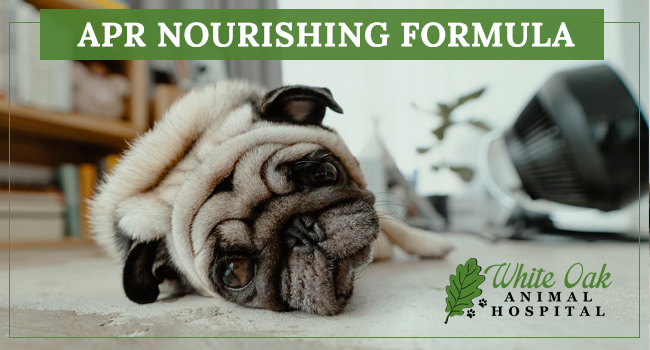
Do you have personal experience with hypothyroidism in dogs?
If a veterinarian has diagnosed your pup with hypothyroidism, you are probably looking for answers.
What is hypothyroidism in dogs?
What causes the condition?
How is it treated?
Can you treat it gently or naturally?
Yes!
In fact, herbal treatment may be beneficial to dogs with hypothyroidism.
What Is Hypothyroidism In Dogs?
Hypothyroidism is a common endocrine disorder.
The condition is caused by an under-active thyroid.
First, you may notice your pup is lethargic, gaining weight, or experiencing changes in their skin and coat.
Next, your vet might diagnose other bodily functions slowing down.
Because of the decreased levels of thyroid hormone, your pet’s metabolism slows, causing weight gain.
What Causes Hypothyroidism In Dogs?
After doing a thorough checkup, your veterinarian may diagnose your pet with a deteriorating thyroid gland, or a tumor on the pituitary gland.
Occasionally, puppies are born with pituitary disorders.
Additionally, hypothyroidism typically affects dogs 4 to 10 years old, in mid- to large-size breeds.
Spayed females are at a slightly higher risk as well.
What Are The Symptoms Of Hypothyroidism In Dogs?
Symptoms may include:
- Lethargy
- Disinterest in exercise
- Weight gain
- Coldness
- Dry skin and coat
- Excessive shedding
- Hair thinning and loss
- Puffy facial skin
- Drooping eyelids
In severe cases, neurological disorders such as paralysis, dizziness and an enlarged esophagus may develop.
Furthermore, non-neutered dogs are at a higher risk for reproductive symptoms.
How Is Hypothyroidism In Dogs Diagnosed?
Only a veterinarian can diagnose your pet with hypothyroidism.
They will conduct blood tests to check hormone levels and consider other factors such as breed and other medications the dog is currently taking.
How To Treat Hypothyroidism In Dogs
Only your veterinarian can determine the best course of treatment for your pet.
Veterinarians commonly recommend pharmaceuticals, due to their efficacy in treating hypothyroidism in dogs.
However, studies show, traditional Chinese herbal medicines in combination with other routine treatment may show some benefit for hyperthyroidism in improving symptoms, signs, thyroid function and in avoiding or reducing some adverse effects caused by antithyroid drugs.
Western Approach To Treating Canine Hypothyroidism
If a vet diagnoses your pet with full-blown autoimmune thyroiditis, treatment involves replacing the lacking hormone with a synthetic thyroid medication.
Pet parents will administer this hormone twice per day, with blood level rechecks every few weeks to ensure efficacy at the onset.
Holistic Approach
Herbal remedies, such as Kan Essentials APR Nourishing Formula, contain Chinese herbs selected for their ability to benefit dogs suffering from hypothyroidism.
For example, studies show Rehmannia lowers adrenal receptors and conversion of thyroid hormones.
Another herb, Asiatic cornelian cherry, was found in a study to lower total cholesterol and LDL levels, as well as increase good cholesterol and decrease the stress hormone cortisol.
Tree peony root bark is another Chinese herb used to treat hypothyroidism in dogs. Vets consider it beneficial in addressing thyroid tumors and also in the early stages of the illness.
Vets also recommend Anemarrhena rhizome for its ability to treat the thirst and excessive appetite that may accompany hypothyroidism.
Phellodendron bark also regulates the levels of cortisol, a hormone produced by the adrenals.
In one study, the herb Poria ameliorated the effects of hypothyroidism.
According to another Chinese study, air potato yam rhizome has a remarkable curative effect of treating thyroid disease, is high in cure rate and almost does not have side effects in external application.
Experts also tout the benefits of Asian water plantain rhizome, known for its diuretic effects and treatment on anti-metabolic disorders.
Looking for a natural solution for your pet’s hypothyroidism?